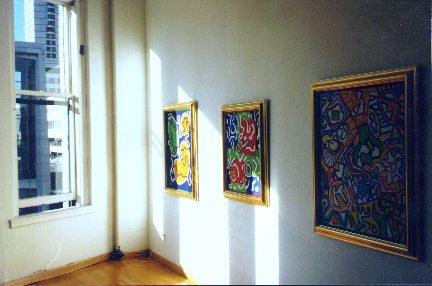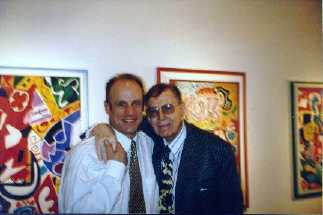Perfection is A Gilded Cage
A Personal Tribute to
Gérard Souzay

In 1983, while studying with Gérard Souzay at the Ravel Academy in St. Jean de Luz, I was asked by my friend Robert Baxter to record a personal greeting from Souzay to be played during a special two-hour survey of his art in opera and song. Also, Davyd Boothe participated in the discussion and choice of material.
I really believe his two-and-a-half minute statement so poetically sums up his standard of performance and the responsibility to one's art, gift and public.
And as always as ever, Souzay speaks in his personal language of music, art and life.
In His Own Words
August 17, 2004
I feel like the world around me has become mysteriously slow and heavy.
That's the effect the news had on me when I heard of the passing of the
greatest singer of french mélodie, not to mention, any form of song: Gérard
Souzay.
I first met him when I was given the opportunity to study in a master class
in Orford (Canada). It was the summer of 1979. We got along very well very
quickly. I had never heard him live at that point and was shunned from
listening to his recordings for fear I might copy him. Anyway, the two-week
class was blessedly interrupted with his recital over the weekend.
Unforgettable. I still remember the program and encores
4 Poulenc (including Priez pour paix, 2 from Chansons Villageoises)
4 Chausson (Srnade italienne, Nos souvenirs, Cantique a lpouse and Les papillons)
Ravel Don Quichotte a Dulcine
==
Dichterliebe
Encores: Montsalvage (forgive my spanish) Del Caballero mas sutil,
Wanderers Nachtlied, de Falla Jota
The recital began with Priez pour paix. If you know this mlodie, you know that it begins with a solitary, quiet high G in the piano, a very simple
but devastatingly mournful introduction (played by Dalton Baldwin). Then
Souzay started singing the words "Priez pour paix, douce vierge Marie". We were all
transfixed, frozen, my mouth open in awe. He grasped our hearts from the beginning and carried us to the
end.
During the classes, we worked on Fauré's Poeme d'un jour, Ravel Histoires naturelles and Don Quichotte a Dulcine, Poulenc's Tel jour telle nuit and Hotel. In the years following, I was able to receive his marvelous poetic direction with many other works of French song, including Poulenc's Calligrammes, La fraicheur et le feu, Faur La bonne chanson, L'Horizon chimrique, Mirages; a handful of Chausson mlodie along with the exquisite work for voice and orchestra, Poeme de l'Amour et de la Mer.
I subsequently heard him in Geneva in an all-schumann program, recitals in
St. Jean de Luz, Delaware, Princeton, Philadelphia (where a second concert was
Bach "Ich habe genug") and New York (twice). The Philadelphia recital,
accompanied by Kenneth Merrill, was especially memorable because Souzay moved me
so with just one single word at the end of this sentence:
Und morgen wird die Sonne wieder scheinen
Forgive me for being so finite, but his "ei" vowel sound opened up a slow
blaze of sunlight. It was incredible.
Dalton Baldwin once said that he has postcards from Poulenc to Souzay saying
"Sing my songs! Sing them in any key but sing my songs!"
Souzay said Italian music is like a kiss on the mouth. German music is like
a kiss on the forehead. French music is like a kiss on the neck.
He was an undisputed master of "voix de tete", that fine but velvety high pianissimo. And yet, was perfectly capable of the low range, as in the two songs Poulenc wrote for a bass voice, two songs that are rarely heard: Hymne and Mazurka. The most endearing part of his voice, in my opinion, was his middle range, wide in scope and, being spontaneous, capable of creating so many colors. He really loved to sing and almost touchingly shy about it.
He said you must perform every song as if it was the world premiere.
He treated me as a colleague and a friend. Always kind to me and extremely
supportive. He inspired me and showed me what real communicating to an
audience was. He was always poetic in his way of expressing himself, in
private and in public. His classes were always popular wherever I
encountered him; he gave a good balance of being a teacher and making it
interesting/entertaining for the audience as well. Watching him teach
Poulenc's Fleurs was heartbreaking. He also was very active in the class,
working with the pianist as well as the singer, being very physical with his
ideas, always let the singer sing through the song once, always gave just a bit of background about the song to an
audience, etc.
He said never sing a recital; give a recital.
I was told that Souzay, for his conservatory graduation, sang the Fountain
Scene from Pelléas. Pierre Bernac, a member of the jury, said every member of that
jury was in tears: he would have been the ideal Pelléas. Though, that was
not to be, he did achieve a wonderful portrayal of Golaud for the EMI
recording with de los Angeles. He said he had always wanted to re-record
the role as the EMI recording was made before he had done it onstage. He
once told me of how Denise Duval, facing upstage for the hair-pulling scene, would
whisper loudly to him (in french) "Go! go my friend".
The subject of favorite things came up and his are: cats, lipstick and Rachmaninoff.
Souzay's parents met each other - by sitting side by side - at the world
premiere of Pellas et Melisande.
He said always leave a third of your interpretation for the performance.
I heard him in what, I am told, was his last public performance. It was the
Faur Requiem, mid-1990s, Dennis Keene conducting in New York.
I adore just about anything he ever vocalized in front of a microphone, but
my favorite period is what I call the middle period. I find nothing wrong
with his early and most of the late - it's just that I think his recordings
from the '60s are such a velvet lined combination of maturity and youth.
The "blue album" (my term) of Poulenc songsis my all-time favorite. The Phillips all-Faur "Mandoline and other songs", the
Phillips Strauss songs, Duparc, Phillips Ravel, Phillips Poulenc cycles, the DG Debussy album, the Phillips Wolf
Italienisches Liederbuch. All of these are with his artistic and life partner, Dalton Baldwin
His favorite singing of his own was always the last two years. Always
trying to improve his technique.
As a young man, he decided to change his name from Tisserand, he chose Souzay when
he came upon a little town in France while riding a bicycle.
In his youth, he recorded pop songs under the name of Roland Thierry.
Souzay is probably smiling now, knowing that he is being discussed on an
opera mailing list. He always wanted to do more opera and be more
recognized as an operatic singer.
Across the globe, countless singers in master class have experienced him in
action. I hope all of us keep our memories of him vivid so that we can pass
along, as best we can, that certain special quality that Gérard Souzay was
in total command of: (---fill in the blank---).
Often, he would announce a certain encore by saying that he "had once been offered a role on Broadway. Though it didn't work out, it would have sounded something like this." He would then launch into "If Ever I Would Leave You" from Camelot. A tall, handsome Frenchman seductively singing Lancelot. Imagine.
As far as I am concerned, he hasn't left us - his art is still here, preserved and always available to inspire and guide us; in other words the essence of Grard Souzay.
Donald Collup
New York
New York Times obituary of Grard Souzay
 January, 1998 - Landon Gallery, Manhattan
January, 1998 - Landon Gallery, Manhattan
Return to HomePage
Go to Ope-ra
Go to the only opera